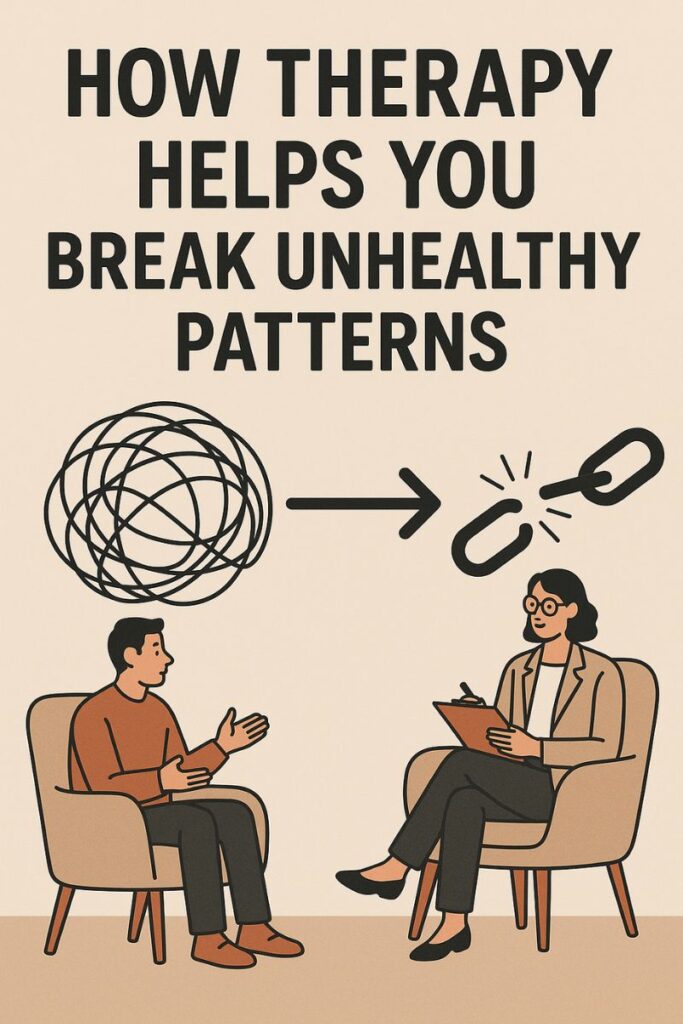Life often places us in situations where we unconsciously repeat the same habits, behaviors, or relationship patterns—even when they no longer serve us. These cycles can be frustrating and sometimes destructive, leaving us feeling stuck or powerless. The good news is that with professional guidance, these patterns can be identified, understood, and changed. Therapy offers a structured, supportive environment to explore the underlying causes of unhealthy behaviors and create healthier alternatives that enhance your well-being.
Understanding Unhealthy Patterns
Unhealthy patterns can appear in many areas of life, such as relationships, work habits, emotional reactions, or self-care routines. For example, you might:
- Find yourself in similar toxic relationships repeatedly
- React with anger or withdrawal during conflict
- Engage in self-sabotaging behaviors
- Struggle with procrastination or avoidance
- Continuously prioritize others at your own expense
These patterns often develop over time as coping mechanisms for stress, trauma, or unmet emotional needs. While they may have once served a purpose, they can eventually limit personal growth and happiness. Identifying these cycles is the first step toward breaking them.
If You Are Located in Birmingham and Seek Therapy
One of the main ways therapy can help is by bringing awareness to the behaviors and habits that keep repeating in your life. Through thoughtful conversations, self-reflection exercises, and guided activities, a therapist can help you recognize patterns that might be hard to see on your own. Seeking therapy in Birmingham gives you access to skilled professionals who can spot these subtle patterns in your relationships, work life, and emotional responses.
Therapists use a range of approaches to uncover these patterns, including cognitive-behavioral therapy (CBT), psychodynamic therapy, and mindfulness-based techniques. By exploring the root causes—whether they stem from past experiences, unconscious beliefs, or long-standing coping strategies—you begin to understand why these cycles keep repeating and how they affect your daily life.
Challenging Unhealthy Beliefs
Many unhealthy patterns are maintained by underlying beliefs about yourself, others, or the world. These may include thoughts such as:
- “I am not worthy of love.”
- “Conflict is dangerous, so I should avoid it.”
- “I must please others to be accepted.”
Therapy helps you examine these beliefs critically. With the guidance of a professional, you can challenge distorted thinking, replace limiting beliefs with healthier alternatives, and gradually change the behaviors that stem from them.
Developing New, Healthier Behaviors
Awareness alone isn’t enough to break patterns—you also need practical strategies for change. Therapy provides tools and techniques to develop healthier behaviors, such as:
- Setting and maintaining boundaries
- Communicating effectively and assertively
- Managing stress and emotional triggers
- Practicing self-compassion and self-care
- Implementing problem-solving strategies
Through repetition and practice, these new behaviors become more automatic, gradually replacing old, unhelpful patterns.
Using Relationships as Mirrors
Therapists often emphasize the role of relationships in identifying patterns. Recurring conflicts, communication difficulties, or emotional triggers within relationships often reflect unresolved personal patterns. Therapy provides a safe space to explore these dynamics and understand how they mirror your internal beliefs or past experiences.
For instance, someone who repeatedly enters relationships with partners who are emotionally unavailable may be replaying unresolved attachment issues. By exploring this pattern in therapy, you can gain insight, recognize red flags earlier, and make more conscious choices.
Emotional Regulation and Awareness
Unhealthy patterns are often fueled by emotional responses that feel automatic. Therapy helps you develop emotional awareness and regulation skills, allowing you to respond thoughtfully instead of reacting impulsively. Mindfulness exercises, cognitive restructuring, and coping strategies learned in therapy equip you to break the cycle of reacting in habitual, unhelpful ways.
Over time, enhanced emotional regulation can reduce anxiety, anger, or impulsivity, making it easier to maintain healthier patterns in daily life.
Consistency and Accountability
Another key benefit of therapy is the consistent support and accountability it provides. Regular sessions encourage reflection on progress, help you navigate setbacks, and maintain motivation for change. Knowing you have a dedicated space to discuss challenges and successes increases the likelihood that new patterns will stick and old patterns will fade.
Long-Term Benefits
Breaking unhealthy patterns doesn’t happen overnight, but the long-term benefits of therapy are profound:
- Greater self-awareness and confidence
- Healthier relationships and communication
- Improved emotional resilience and coping skills
- Reduced stress, anxiety, or depression
- A stronger sense of agency and personal empowerment
These changes accumulate over time, creating lasting improvements in your mental health and overall quality of life.
Getting Started
If you recognize recurring patterns in your life and want to create meaningful change, seeking professional guidance can be transformative. Therapy is not a quick fix—it’s a structured process that helps you develop the insight, tools, and habits necessary to break cycles and build the life you want.
Taking the first step may feel intimidating, but committing to understanding yourself and working through your patterns is one of the most empowering decisions you can make. With dedication, patience, and the right guidance, breaking unhealthy patterns becomes not only possible but sustainable.

